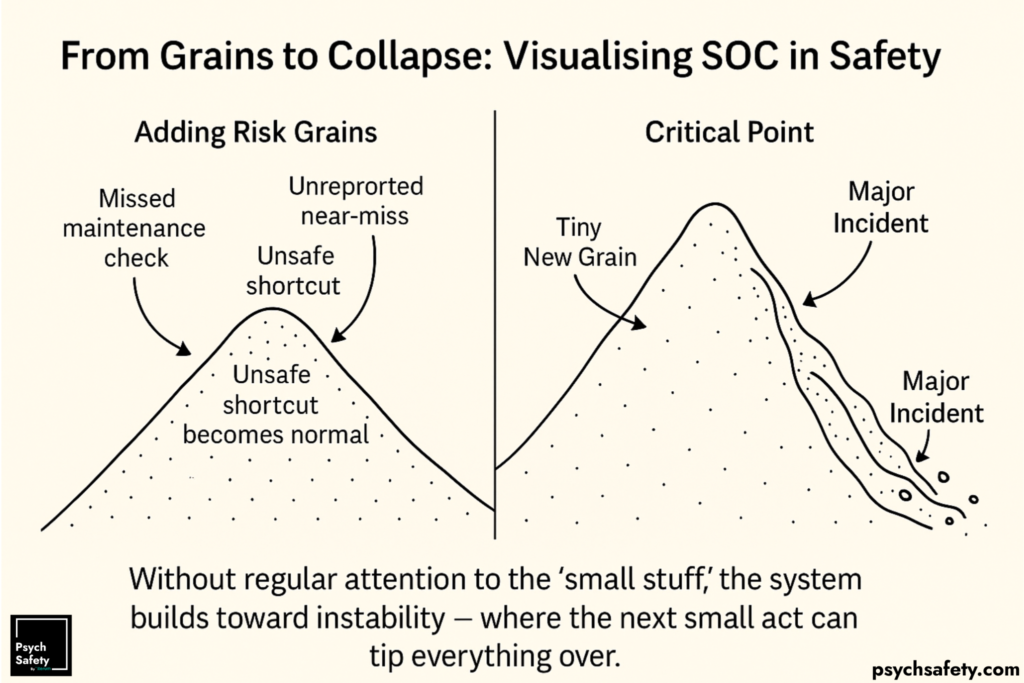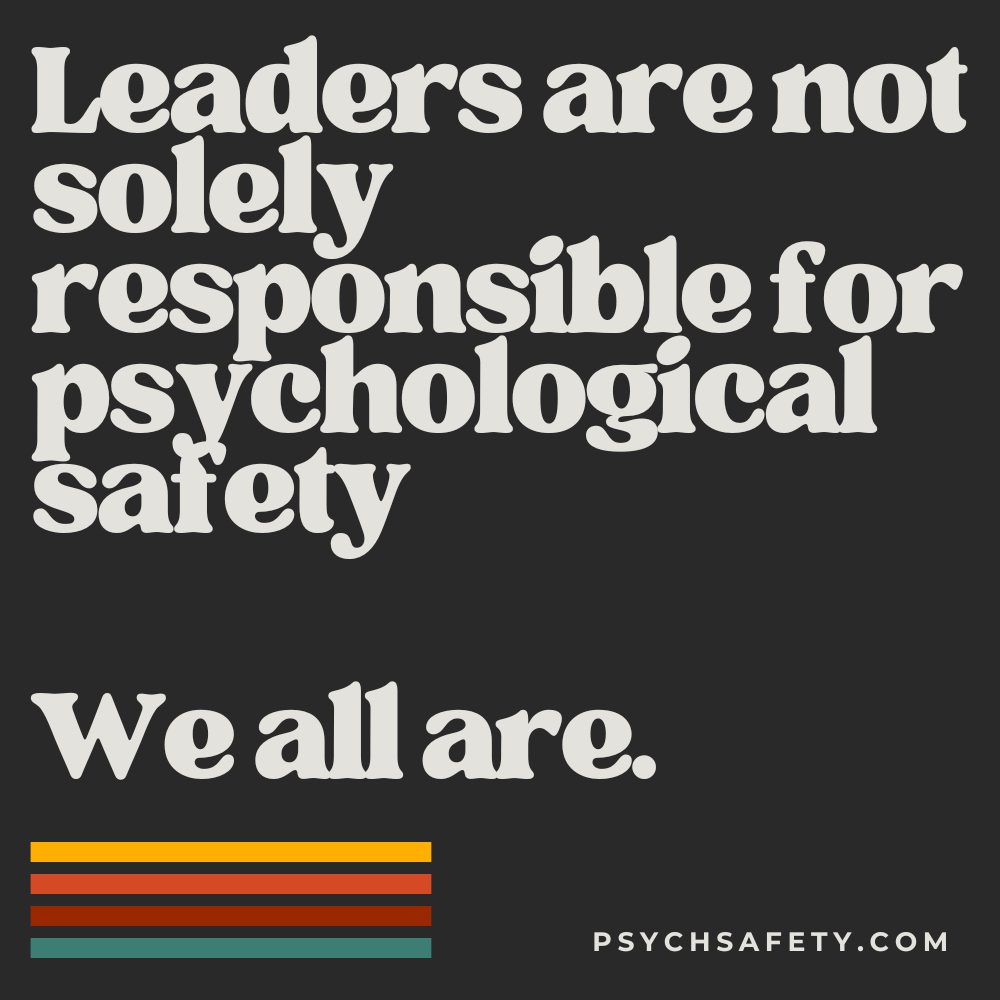Psychological Safety and Micromanagement
By Jade Garratt
Those who have followed our work at Psych Safety for a while will know that we believe exploring not just what to do – the behaviours and practices that support psychological safety – but also what to avoid can be hugely valuable. Understanding the behaviours that damage psychological safety, what not to do, and even what not to say can help us build better workplaces.
There are many behaviours that damage psychological safety, and one that almost always comes up in our workshops when discussing cultures of fear is micromanagement. So we thought it was time we explored micromanagement in more detail, considering how and why it damages psychological safety and what we can do instead.
What do we mean by micromanagement?
Micromanagement is a particular approach to leadership where a manager exhibits overly controlling behaviours or an excessive and inappropriate focus on minor details. They might scrutinise their team’s work closely, insist on checking work, refrain from delegating, and limit the autonomy people need to do their jobs well. It can also manifest as an authoritarian leadership style, where decision-making is centralised (back to themselves) and employees have little say in their work.
Giveaway Signs of Micromanagement
Some indicators of micromanagement may include:
- Excessive time spent in meetings to ‘report’ on progress
- Constant requests for updates, even when no progress has been made
- A culture of asking for permission rather than stating intent
- A requirement to copy a manager into every email
- Phrases like “I run a tight ship”, “Keep me in the loop on everything”, or “Nothing goes out without my approval.”
- Rigid rules around working hours, location, patterns and breaks
- Surveillance and tracking tools to monitor screen time or cursor movement
- Requirements for excessively detailed documentation.
Some of these, such as tracking cursor movements, are clearly oppressive. Others are more subjective. We all have different perspectives on what constitutes excessive scrutiny – how much time is ‘too much’ for progress updates? When is copying a manager in on emails useful, and when does it indicate a lack of trust? And this subjectivity can make it even harder to address. If different people define micromanagement differently, then it’s easy to dismiss concerns as overreactions or just ‘how we do things here’. This ambiguity can leave us feeling frustrated and powerless, unsure whether what we’re experiencing is ‘normal’ or an unhealthy dynamic that needs to change.

Why is micromanagement bad for psychological safety?
If we feel we’re being micromanaged, we might feel more anxious or worried at work, because when our manager is very prescriptive about how to do the work, we may well fear that we’re more likely to get it wrong. We might also conclude that our manager doesn’t trust us, or doesn’t think we can do a good enough job by ourselves, which might make us more reluctant to ask questions or admit mistakes, and risk further damaging their perception of us. And similarly, in a micromanaged environment, not only are we not given space to take the initiative to try something different, we’re unlikely to think that our new or innovative ideas or improvements will be welcomed.
At best, micromanagement is mildly annoying. At worst it can dramatically impact our ability to deliver value, as well as be completely disempowering and detract from any meaning or satisfaction we might otherwise draw from our work. It’s very likely to be an antipattern to team learning.
No one thinks they’re a micromanager
Almost everyone we speak to has some experience of feeling micromanaged, but it’s a rare person who thinks they’re a micromanager. So there’s a strong possibility here that micromanagement is not a conscious or intentional behaviour. And that as uncomfortable as it might be to admit it, it’s likely that at some point, many of us have inadvertently been micromanagers.
So why might we become accidental micromanagers? Research suggests that it can be to do with our own personal insecurities and fears – if we’re still ‘finding our feet’ in our management role, it may well be hard to relax a little and let our team take the reins. We might also not know the team and their strengths well enough yet, so might doubt their ability to do it without us. Alternatively, if there are issues in the wider organisational culture and we’re being held to impossibly high standards and expectations, or we’re working in a very high stakes environment and we’re very fearful of failure ourselves, we might micromanage in order to mitigate the risk of our team making mistakes.
Micromanagement might also be a symptom of our deeper beliefs and learned behaviours from how we’ve been managed around what it means to be a manager – for instance if we have an entrenched belief in a ‘power over’ model, where management means always being ‘in charge’, having all the answers and mandating rigid compliance, we’re more likely to resist distributing or sharing that power. Some have even suggested that in ‘top-heavy’ organisations, where there are lots of managers, we might be prone to meddling in the team’s work because we simply don’t have enough to do.
At an even simpler level, micromanagement might simply come down to a lack of communication with team members and a disconnect between what we think they need and what they actually need. It may be a lack of a shared “Definition of Done”. We may well be that we think we’re being helpful or supportive, not realising that they’re finding our level of intervention too much.
Addressing micromanagement
If we are the one feeling micromanaged, then we could wait it out and hope that in time our manager builds the trust and confidence to let us have a bit more autonomy. This may or may not work. We might need to be more direct and have a conversation with our manager about it – perhaps one where we explain what’s happening from our perspective, how it’s affecting us, and make a request to try a different way of working. This can be tricky, and of course requires a degree of psychological safety to even have the conversation. Our article on building psychological safety upwards may be useful here.
If we’re the manager (and potential micromanager!) how do we avoid micromanaging?
- Stay open to the possibility that we might be micromanaging, even unintentionally.
- Try to understand what it feels like to be managed by us. If unsure, ask, maybe in your 15/5 report! Questions like:
- “Is there more, or less, I could be doing to support you?”
- “When should we next check in about this?”
- “Is this level of detail helpful, or would a more open brief be better?”
- “This is the goal-how do you think we should proceed?”
- “Would you like me to do X, or am I micromanaging?”
- Define, with our team, what is ‘safe to fail’ and how we make these decisions. Being clearer about where experimentation and innovation is helpful lets us be more confident that team members won’t unwittingly go ‘off piste’.
- Accept that we won’t always get it right. What feels supportive to one person may feel overbearing to another. It’ll change over time too. Checking in and adjusting is key.
- Work towards what Drucker termed “a democracy of management” – decentralising decision-making and giving more decision-making authority to those who are closer to the ‘sharp end’ of work, or at least inviting a more participatory approach.
Finding the Balance
Like most things, leadership requires balance – between support and autonomy, guidance and trust. Micromanagement is rarely about bad intentions; more often, it comes from fear, habit, organisational structure or misunderstanding. But we do need to recognise its impact and do what we can to address it if we want to create workplaces where people feel trusted, capable, and psychologically safe to do their best work.
References and Further Reading:
- van de Ridder, J. M. M., DeSanctis, J. T., Mookerjee, A. L., & Rajput, V. (2020). Micromanagement creates a nonconducive learning environment for a teaching team. Journal of Graduate Medical Education, 12(5), 639-640. https://doi.org/10.4300/JGME-D-20-00926.1
- White, R. D. (2010). The micromanagement disease: Symptoms, diagnosis, and cure. Public Personnel Management, 39(1), 71-76. https://doi.org/10.1177/009102601003900105
- Marquet, L. D. (2013). Turn the Ship Around! Penguin.
- Building Psychological Safety Upwards
- Spectra of Participation
- Safe to Fail Experiments
- 15/5 Reports
- Behaviours that damage psychological safety
Psychological Safety in Practice
Co-Designing Safer Skies
I like a lot in this piece by Kimberly Perkins and Fabio Mattioli in FSF on how Crew Resource Management (CRM) has evolved from its early days to incorporating concepts like Threat and Error Management (TEM), calls for an even more advanced approach that they term Adaptive Dynamics for Resilient Systems (ADRS). ADRS aims to integrate traditional safety practices with insights from psychological safety, emotional intelligence, interpersonal dynamics, proven safety metrics and other principles such as Safety‑II.
Thanks to Nick Travaglini in the Resilience in Software Community for the share.
Empathy and cognitive load
In one of our workshops this week we were discussing cognitive load in a team, and how it affects psychological safety. The discussion went to empathy, and I remembered this excellent paper from 2023. The authors found that high cognitive load reduces “prosocial” behaviour – that is, behaviour intended to help or benefit other people or society as a whole, but this effect is mitigated by high empathy.
What we can take from this is that when people feel overwhelmed or overloaded, our tendency to notice that others need help or support, and our inclination to do so, reduces. But by fostering greater empathy and understanding (for example, by reading fiction), we can mitigate this effect. Though, of course, an even better approach would be to avoid overly high cognitive load in the first place.
Power and Safety
We bang on about power in organisations, power and authority gradients, types of power and how all these affect psychological safety (and as a result, physical safety). This is a great episode of Punk Rock Safety where Ben, Dave, and Ron get into power and safety – who holds the power, who makes the decisions, and who has the knowledge? They get into the misuse of power, deference to expertise, David’s Marquet’s “moving authority” concept, power gradients and more. “Slather psychological safety on everything, like butter.“
This week’s poem:
We Refugees, by Benjamin Zephaniah
I come from a musical place
Where they shoot me for my song
And my brother has been tortured
By my brother in my land.
I come from a beautiful place
Where they hate my shade of skin
They don’t like the way I pray
And they ban free poetry.
I come from a beautiful place
Where girls cannot go to school
There you are told what to believe
And even young boys must grow beards.
I come from a great old forest
I think it is now a field
And the people I once knew
Are not there now.
We can all be refugees
Nobody is safe,
All it takes is a mad leader
Or no rain to bring forth food,
We can all be refugees
We can all be told to go,
We can be hated by someone
For being someone.
I come from a beautiful place
Where the valley floods each year
And each year the hurricane tells us
That we must keep moving on.
I come from an ancient place
All my family were born there
And I would like to go there
But I really want to live.
I come from a sunny, sandy place
Where tourists go to darken skin
And dealers like to sell guns there
I just can’t tell you what’s the price.
I am told I have no country now
I am told I am a lie
I am told that modern history books
May forget my name.
We can all be refugees
Sometimes it only takes a day,
Sometimes it only takes a handshake
Or a paper that is signed.
We all came from refugees
Nobody simply just appeared,
Nobody’s here without a struggle,
And why should we live in fear
Of the weather or the troubles?
We all came here from somewhere.
The post Micromanagement appeared first on Psych Safety.






